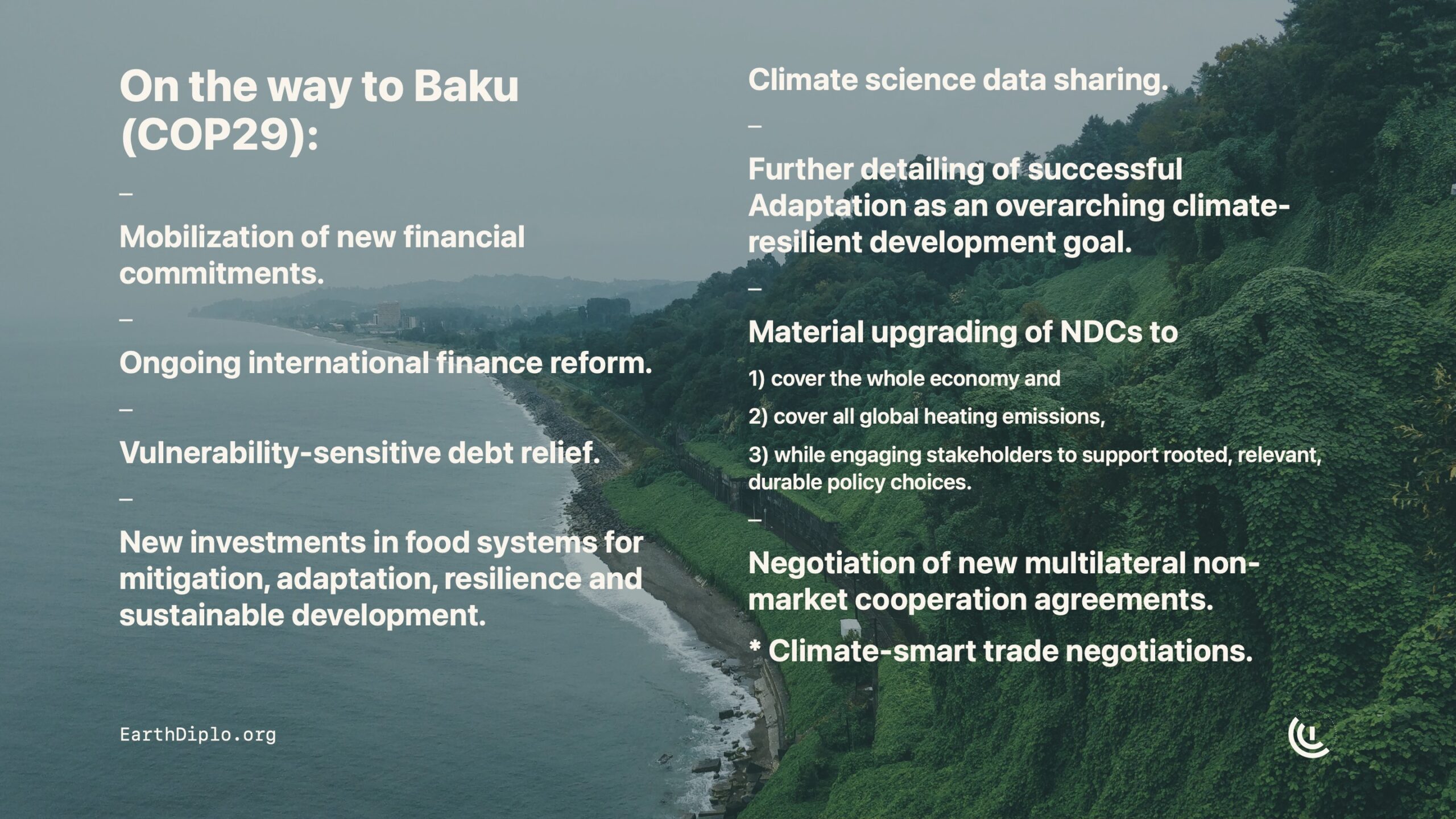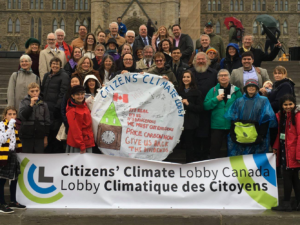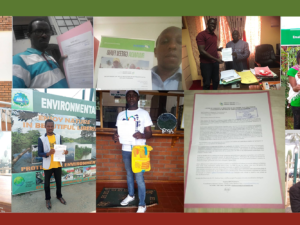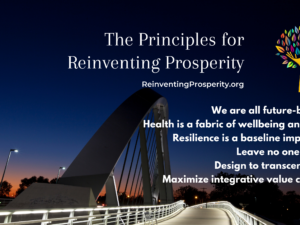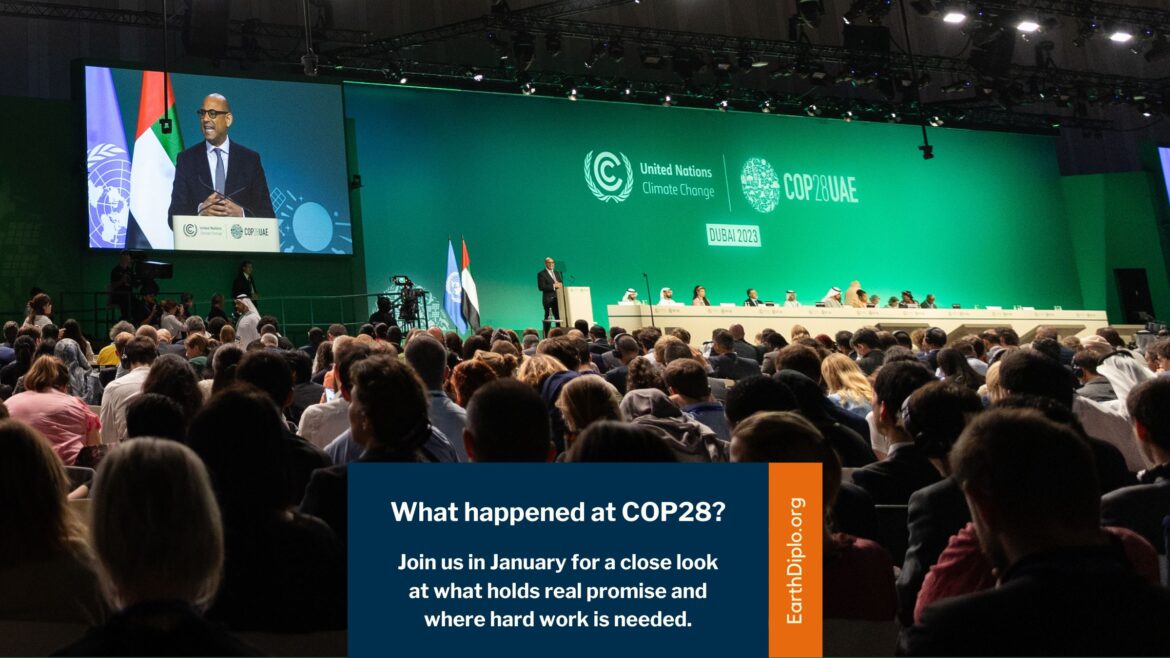
Earth Diplomacy Leadership Initiative
COP28 Outcomes: Making new law for climate-smart transformation
- Wednesday, January 10, 2024
- 09:00-11:00 EST / 14:00-16:00 UTC
- 14:00 London / 15:00 Lagos / 15:00 Paris / 18:00 Dubai / 19:30 Delhi / 23:00 Tokyo
The Earth Diplomacy Leadership Initiative is co-coordinated by Citizens’ Climate International and The Fletcher School at Tufts University.
Today, we held the Earth Diplomacy Leadership COP28 Debrief session. The workshop followed six pre-COP preparatory sessions and a series of informal check-ins before, during, and after the COP28 negotiations. The following presenters (listed in order of appearance) shared insights on the COP28 process, formal outcomes, voluntary initiatives, and the hard work still ahead to secure a future of successful climate-resilient development.
- Joe Robertson – CCI; Climate Value
- Selamawit Wubet – Global Center on Adaptation
- Dr. Katharine Hayhoe – Texas Tech; The Nature Conservancy
- Dr. Isatis Cintrón – CCI; Columbia University
- Prof. Mizan Khan – ICCCAD
- Sara Farley – Rockefeller Foundation
- Dr. Nfamara Dampha – University of Minnesota
- Rachel Kyte – Blavatnik School, Oxford University
Presenters discussed a wide range of COP28 outcomes, and some ongoing controversies, including, among others:
- The historic decision to formalize creation of a Loss and Damage Fund;
- The decision to transition away from fossil fuels;
- Recognition this must align with the Convention mandate to “prevent dangerous anthropogenic interference with the climate system”, and align with the science findings laid out in the IPCC’s 6th Assessment Report;
- Recognition of “the importance of ensuring the integrity of all ecosystems, including in forests, the ocean, mountains, and the cryosphere”;
- The Global Stocktake process, and lessons learned for such reviews and recommendations for upgrading, in the future;
- The decision to triple renewable energy capacity and double energy efficiency, as part of the overall transition;
- The importance of ensuring expanded access to affordable clean energy, to ensure a just transition and inclusive climate-resilient development;
- The Global Goal on Adaptation, which now requires further refined metrics, along with better structural incentives, cooperative approaches, and financing;
- Voluntary commitments on food systems, climate-smart investment, data-sharing, and cooperation to enhanced overall ambition;
- The need to better realize the needed shift in mindset and practice from visionary policy negotiation to everyday implementation of climate goals;
- And, the nature of the negotiating process, including how it is affected by the presence of industry interests and by limits on observers’ freedom to comment, organize, and intervene.
We heard from Dr. Katharine Hayhoe about the solid and long-standing scientific consensus. Each report provides more clarity and precision, but we have known since the 1890s that each ton of CO2 emitted contributes to global heating. New evidence shows that each increment of 0.1ºC carries significant, measurable heating effects, which add to Earth’s energy imbalance and create expanded risk of destabilizing climate impacts.
Political priorities and constraints have repeatedly caused decision-making at the national and international levels to diverge from the safer course science shows we should follow. We know we must eliminate global heating emissions, and yet political and geopolitical forces continue to align with the idea that short-term profits from pollution are too convenient to pass up.
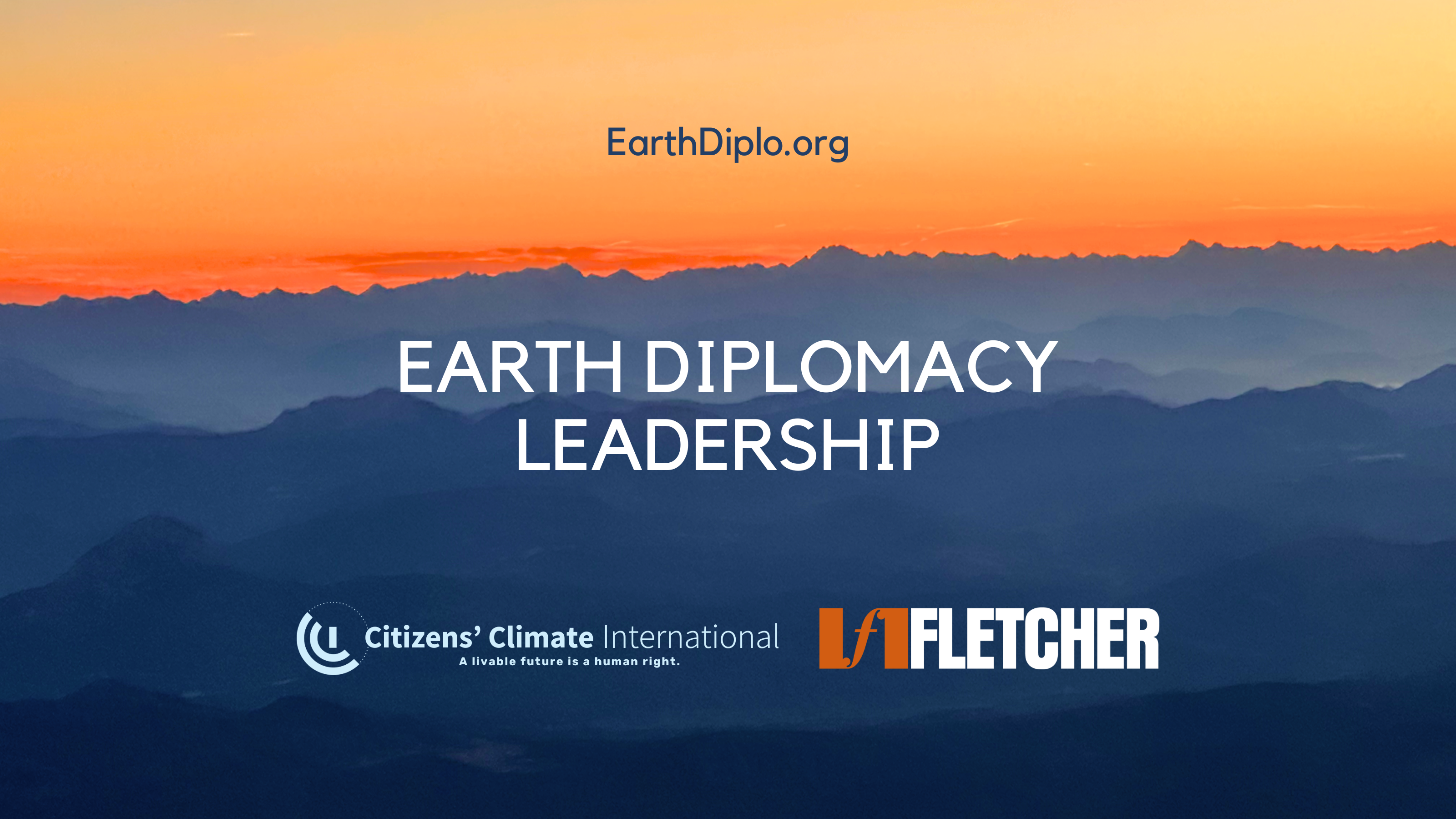
For more information about the Earth Diplomacy Leadership Initiative, and preparatory workshops ahead of United Nations Climate Change negotiations and other intergovernmental processes, go to EarthDiplo.org
In 2023, fossil fuel subsidies reached an all-time high, and major corporate polluters are paying record dividends to shareholders. That is bad for the climate, and for all of the human impacts that result from destabilization of the climate system. It is also economically and fiscally unhealthy, and precisely the kind of dynamic that observers attribute to the global breakdown in trust toward public institutions and leading corporations.
We once again highlighted, for context, the deep and pervasive human impact of unchecked climate change, driven by business as usual, as outlined in the 2023 State of the Climate report. That report, released just weeks before the COP28, included the finding that:
“By the end of this century, an estimated 3 to 6 billion individuals — approximately one-third to one-half of the global population — might find themselves confined beyond the livable region, encountering severe heat, limited food availability, and elevated mortality rates because of the effects of climate change (Lenton et al. 2023).”
Citizens’ Climate International’s perspective on the COP28 was that, according to the Convention mandate, Paris Agreement, consensus science, and overall range of agreed commitments, the transition away from fossil fuels is now effectively international law. Language seeking to carve out room for expanded global heating emissions, by contrast, is really just a wish—not altering the overall legal responsibility of governments to prevent dangerous climate change.
The CCI presentation also pointed to some expected areas of advance work on the way to the COP29 round of negotiations in Baku, Azerbaijan. Advances in the areas listed below will be critical for converting ambitious commitments into real-world progress toward successful climate-resilient development.
There were several mentions by presenters, and multiple questions in the closing discussion, about carbon pricing. Since non-market carbon taxes were discussed in Dubai as an efficient way for countries to enhance NDCs, and a possible mode of international cooperation to set new incentives for cleaner business models, we looked at what might be needed, institutionally, to unlock that opportunity.
Countries are asking for guidance on policy choices, and on pathways to evolving their respective incentive structures, to reshape their economies, but there is resistance to enforcement from abroad, or conditionalities in international financial arrangements. Those enforcement mechanisms and conditionalities might come anyway, however, if overall climate crisis response continues to move too slowly, adding to the overall risk, harm, and cost facing countries, regions, and the international financial system.
Vulnerability and justice were consistent themes throughout the session. Financial arrangements must evolve to account for vulnerability and decline to impose additional debt burden due to vulnerability. The Loss and Damage Fund can be part of such a process, if it does not impose new debt on countries forced to deal with climate impacts they did not create. But financial innovation must go beyond that, to include vulnerability-sensitive debt relief and to support direct access to international finance for affected communities.
Some preliminary takeaways, beyond what we report above:
- The Illusion of Immunity – Some people, countries, and businesses, might be safe from serious climate damage for some time, while others experience danger, but such selective safety can be misleading. By the time the privileged and protected experience danger personally, extreme climate destabilization and nature breakdown will have advanced so far as to be unrecoverable.
- Extreme fossil fuel subsidies are a sign of industrial, commercial, and political failure. Healthy dominant industries should not need, seek, or extract windfall profits from record subsidies, and governments should not be left with no choice but to reinforce such schemes. Transition strategies need to include smart subsidy shifting and pollution pricing.
- Climate-smart economies are good for everyone. We need to evolve economies that meet human needs and aspirations. This is critical for the climate, but also for restoring trust in governance overall. Climate-degrading activities are degrading our ability to work together, to solve problems, both in the everyday and at planetary scale.
- Funding to address Loss and Damage is an area of overwhelming need, and the last area where financial arrangements should generate additional debt. Funding for loss and damage response should include direct access, with less room for money going to something other than the needs of the vulnerable.
- Transparency is legitimacy – All nations need factual information about progress toward climate goals. Underlying international law is the implicit requirement that legal commitments, even voluntary ones, are made in good faith, and all Parties will act to achieve the healthiest collective outcome. Future success for everyone depends on actions that meet the moment, now.
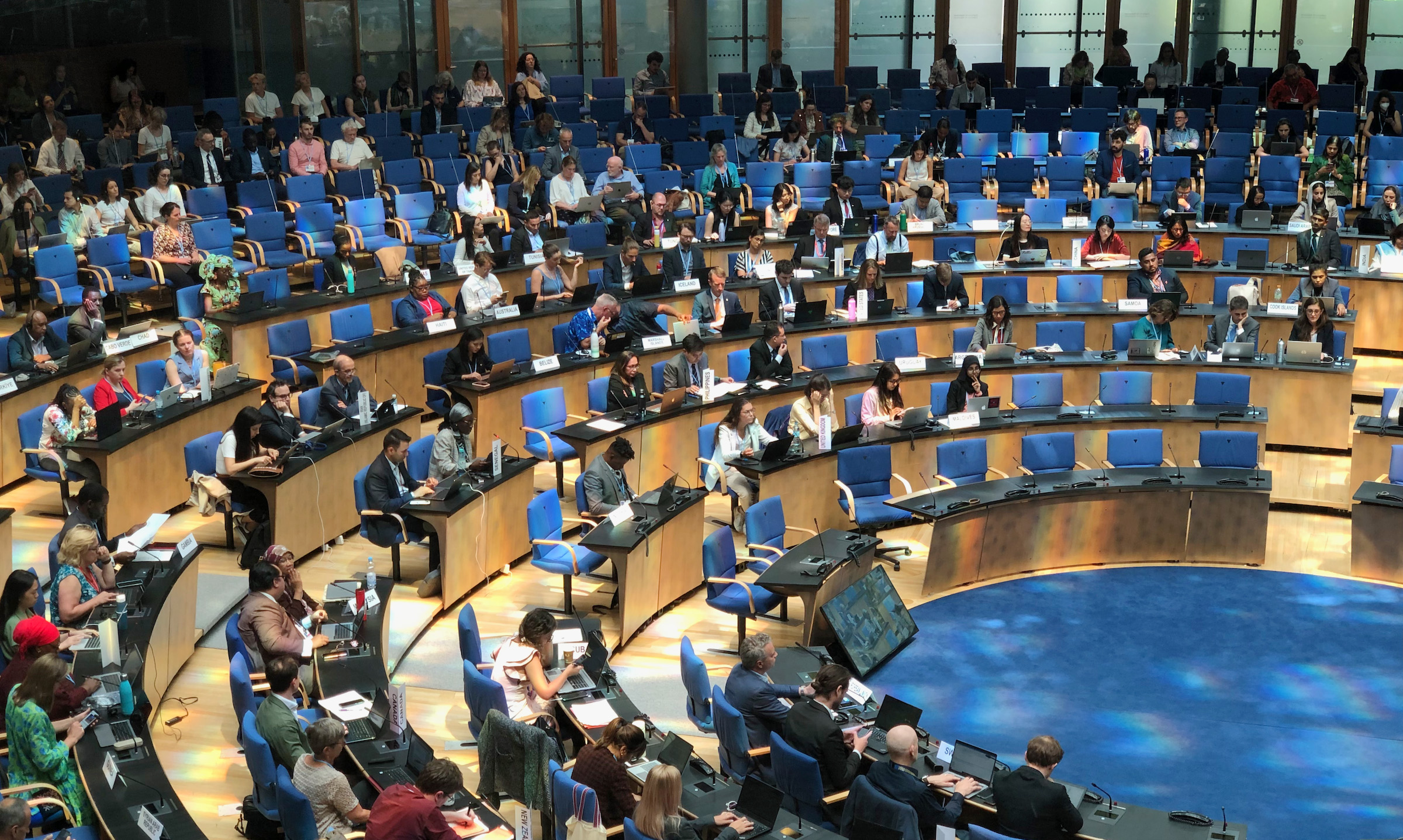
These structural insights and the hard work of converting commitments made in negotiating rooms into real-world transformation in the everyday lives of communities, will be among the subjects needing focused attention during the mid-year UN Climate Change negotiations in June, in Bonn, Germany. Photo credit: CCI.
In closing, Rachel Kyte noted that we are moving into a new era, in which practical diplomacy will gather momentum. What countries perceive as practical may vary, and we know to expect some countries to work against the global transition away from fossil fuels. We also know that increasingly refined and effective tools are emerging for understanding progress toward effective climate crisis response and for incentivizing actions toward a better future.
We are now working toward a February session which will focus on the Journey to Baku:
- What critical legal and policy innovations are ready to go?
- What actions need to see expanded and sustained international support?
- Which key events across the multilateral landscape provide opportunities for upgrading climate ambition, before it is too late to avoid a future of deep destabilization, insecurity, and deprivation?
We will add further background materials, reports, comments, and events, from participants in this session and other Earth Diplomacy Leadership instructors, in the COP28 Debrief section of the EarthDiplo.org site. Read further COP28 reporting and partner insights at ClimateValue.net.
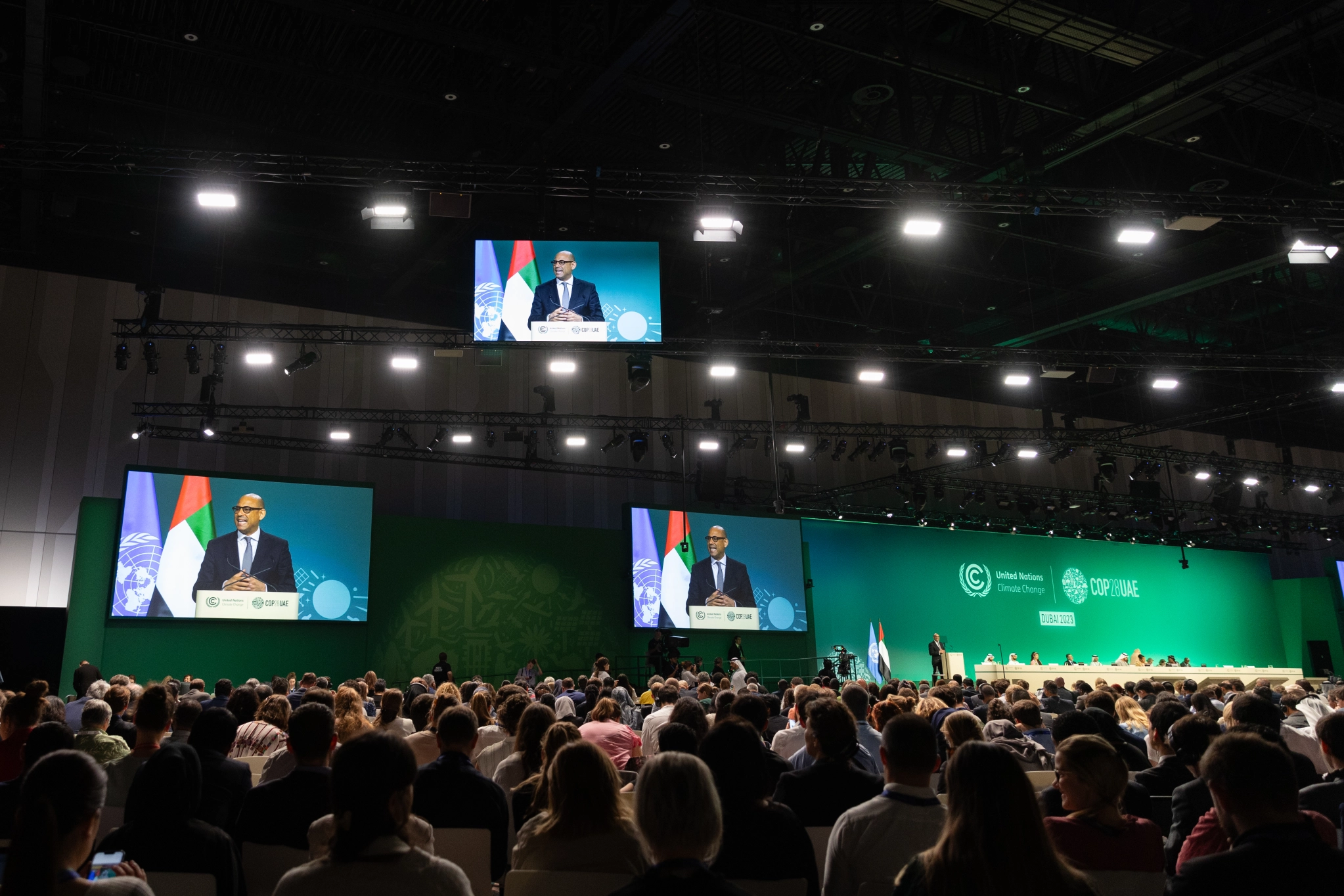
The featured image for this event is a view of UNFCCC Executive Secretary Simon Stiell addressing the COP28 plenary. Photo credit: Kiara Worth/UN Climate Change via Flickr, CC BY-NC-SA


